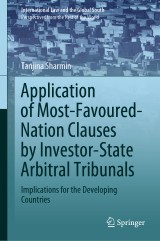Details

Application of Most-Favoured-Nation Clauses by Investor-State Arbitral Tribunals
Implications for the Developing CountriesInternational Law and the Global South
|
96,29 € |
|
| Verlag: | Springer |
| Format: | |
| Veröffentl.: | 01.04.2020 |
| ISBN/EAN: | 9789811537301 |
| Sprache: | englisch |
Dieses eBook enthält ein Wasserzeichen.
Beschreibungen
<p>This book comprehensively examines various issues regarding the scope of Most-Favoured Nation (MFN) Clauses in International Investment Agreements (IIAs), and addresses the reform, interpretation, and enforcement of IIAs with a specific focus on the MFN clause. The book begins with a study of the history and evolution of the MFN. It then presents a substantive analysis focusing on the drafting style and how it affects the scope of the MFN; rules of interpretation and arbitral case law on the scope of the MFN, procedural prerequisites to arbitration and jurisdiction of arbitral tribunals, and the implications of adopting an expansive approach to the MFN clause. </p><p>The book’s argument centres on the need for arbitral tribunals to interpret the MFN in a manner that reflects the expressed intent of the parties. This requires taking into consideration the text of the MFN, its purpose, and the overall context of the IIA, rather than relying on values and assumptions that have nothingto do with the original intent of the parties. In making this argument, the book draws on Articles 31 and 32 of the Vienna Convention on the Law of Treaties and other interpretative rules. What sets the book apart is its comprehensive coverage of issues concerning the interpretation and application of the MFN in IIAs. At the same time, it addresses issues in connection with an expansive interpretation of MFN clauses, as well as concerns regarding the legitimacy crisis in investor-state arbitration. Accordingly, it contributes to future Investor-State Dispute Settlement (ISDS) reform, while also offering a wealth of theoretical and practical insights for future treaty drafters, arbitrators, and policymakers. </p><p> </p><p> </p><p></p><p></p>
<p>Chapter 1. Introduction.- Chapter 2. Evolution of MFN Treatment and Trends of Drafting in the Older Generation IIAS.- Chapter 3. Principles of Interpretation.- Chapter 4. Application of MFN to Substantive Benefits.- Chapter 5. Application of MFN To Procedural Prerequisites to Arbitration.- Chapter 6. Application of MFN to Extend Jurisdiction of Arbitral Tribunals.- Chapter 7. Conclusion.</p>
<p></p><p>Tanjina Sharmin is a full-time lecturer at the Faculty of Law, Monash University. She completed her PhD with a specialization in International Law at Monash University, and received a Monash International Postgraduate Research Scholarship and Monash Graduate Research Scholarship. She completed her LLM with a specialization in Commercial Law at the University of Cambridge on a Commonwealth Scholarship, prior to completing her LLB at the University of Dhaka. Her research chiefly focuses on International Economic Law and Investor-State Arbitration. She has published articles in internationally respected peer-reviewed law journals, and a book chapter in the Handbook on International Investment Law and Policy edited by Julien Chaisse, Leïla Choukroune, and Sufian Jusoh (published by Springer). </p>
<p> </p><br><p></p>
<p> </p><br><p></p>
<p>This book comprehensively examines various issues regarding the scope of Most-Favoured Nation (MFN) Clauses in International Investment Agreements (IIAs), and addresses the reform, interpretation, and enforcement of IIAs with a specific focus on the MFN clause. The book begins with a study of the history and evolution of the MFN. It then presents a substantive analysis focusing on the drafting style and how it affects the scope of the MFN; rules of interpretation and arbitral case law on the scope of the MFN, procedural prerequisites to arbitration and jurisdiction of arbitral tribunals, and the implications of adopting an expansive approach to the MFN clause.</p>The book’s argument centres on the need for arbitral tribunals to interpret the MFN in a manner that reflects the expressed intent of the parties. This requires taking into consideration the text of the MFN, its purpose, and the overall context of the IIA, rather than relying on values and assumptions that have nothing to do with the original intent of the parties. In making this argument, the book draws on Articles 31 and 32 of the Vienna Convention on the Law of Treaties and other interpretative rules. What sets the book apart is its comprehensive coverage of issues concerning the interpretation and application of the MFN in IIAs. At the same time, it addresses issues in connection with an expansive interpretation of MFN clauses, as well as concerns regarding the legitimacy crisis in investor-state arbitration. Accordingly, it contributes to future Investor-State Dispute Settlement (ISDS) reform, while also offering a wealth of theoretical and practical insights for future treaty drafters, arbitrators, and policymakers.<p></p>
Comprehensively discusses issues related to the scope of MFN clauses in IIAs Analyses all publicly available arbitral decisions on the application of MFN clauses to substantive, procedural, and jurisdictional issues Offers effective solutions to the problems entailed by an expansive interpretation of MFN clauses
Diese Produkte könnten Sie auch interessieren:

Spreading Democracy and the Rule of Law?

von: Wojciech Sadurski, Adam Czarnota, Martin Krygier

149,79 €















